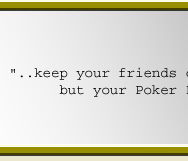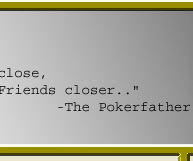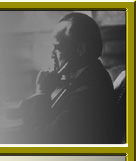(Click Here for the Latest Online Poker News Stories)
Copyright © 2006 Philly.com
February 5, 2006
HEADLINE:
Online poker 101: A lesson in losing
Author: Patrick Kerkstra
Body:
Internet card games are the new campus craze. For some, it's
a test to prove their intelligence. But the gambling can spin
out of control.
Ari Paul's dorm room at the University of Pennsylvania has the
trappings of the contemporary collegiate male: acoustic guitar,
Hooters calendar, supersize bag of tortilla chips on the floor,
and dual flat-screen computer monitors at which he's playing three
simultaneous hands of online poker.
The game is Omaha high,
close to Texas hold
'em. Cards flick across the screens at a speed no casino dealer
could match.
The stakes are low by Paul's old standards, a total buy-in of
just $500 at the three virtual tables. A political science major
in a grueling senior year, he has reined in his game since last
summer, when he routinely logged into online poker "rooms"
with $3,000 and stayed 12 hours. His win rate (he calls it "expected
value") has tumbled from $150 an hour to $30.
Still, he claims to be up about $30,000 over two years.
If his accounting is accurate, Paul is far more skilled and certainly
luckier than most of the estimated 1.6 million, overwhelmingly
male college students nationwide who in the last few years have
become regular - some admit addicted - players of Internet
poker.
Twenty-six percent of college men gamble in online card games
at least once a month and 4 percent once a week or more, up from
1 percent a year earlier, according to a 2005 survey by Penn's
Annenberg Public Policy Center. The vast majority are betting
on poker.
"We keep waiting for it to peak," said Dan Romer, director
of the Risk Survey of Youth. "So far, it hasn't."
For generations of college students killing time, penny ante
was a staple of dorm life. Then along came television's million-dollar
prime-time tourneys about five years ago to gild poker in trendiness.
By 2003, the fever was sweeping the Internet.
The Justice Department considers Internet
gambling illegal at any age. So the online poker rooms - at
least 300 of them - are based outside the United States, with
many in Canada but the largest in Gibraltar. Their profits come
from raking in a very fat pot: $60 billion bet worldwide last
year, according to London analysts who research the online poker
industry for investors.
At any given moment, the rooms are filled with thousands of players
seated up to 10 per table and known to one another only by handles
such as ElDonkerino and Chiptaker32.
All it takes to get in the game is a computer and a credit card.
And what college student doesn't have those?
Greg Hogan did.
The 19-year-old son of a Baptist minister from Ohio, he was president
of his sophomore Class of 2008 at Lehigh University. He also was
an avid online poker player, although not quite as good at it
as Ari Paul.
On Dec. 9, he walked into an Allentown bank, handed a teller
a note claiming he had a gun, and left with $2,871. The young
man's motivation, his attorney said, was $5,000 in poker debts.
Now in a gambling addiction program in Louisiana, Hogan faces
a preliminary hearing early next month. A guilty plea or a conviction
could land him in prison for up to 20 years.
Romer, of the Annenberg Center, said he hoped the bizarre heist
would make colleges and parents take notice of what's going on
behind closed dorm doors.
"The awareness is just not there yet that some kids who
are exposed to this are going to get hooked," he said. "These
kids are pretty smart, and they think poker is a skill-based form
of gambling that they can control. But a lot of them can't."
Jeff Simon, 18, is one of them.
He followed a typical path into Internet poker rooms, beginning
in 10th grade when he and his father watched regular pro tournaments
on TV. As a junior, he cut his teeth on low-stakes games against
his buddies in one of their basements, and usually won.
That year, he started playing online, where the action was exponentially
faster and the opponents more cunning and experienced. He bet
money he made at a host of part-time jobs.
"I'd always deposit $50 or $100 at a time. It didn't seem
too serious. But I would do it over and over and over again,"
said Simon, now a freshman at a university in the Pennsylvania
suburbs. Although he allowed his real name to be used, he asked
that his school not be identified so he wouldn't be so easily
singled out on campus.
Simon told his parents of his addiction before starting college
and asked them to hold his earnings from his summer jobs.
They returned the money shortly before he moved into his dorm.
Instantly, he was playing full tilt and emptying his bank account.
He placed his losses as high as $8,500.
Less than two months ago, Simon folded. He spoke to a psychologist
and went to Gamblers Anonymous meetings. He resisted filling out
tantalizing credit-card applications that would have allowed him
to keep wagering. And he revisited dozens of his old online poker
haunts - to fill out forms instructing them to bar him from ever
playing there again.
"There was nothing to stop me," he said, "but
myself."
•
Colleges have done little to break up the game.
"I'm sure students are playing it," said Penn spokeswoman
Phyllis Holtzman, "but it's not on anyone's radar screen
administratively."
Some schools are even playing along.
At Lehigh University - the ill-starred Greg Hogan's almost-alma
mater - students in one computer science course are instructed
to create a "bot" that simulates a human poker player.
The class features $13,000 worth of software donated by a firm
called Poker Academy.
Other Philadelphia area universities, including Temple, Drexel,
Rowan and St. Joseph's, routinely give the official nod to charity
hold 'em tournaments and poker nights on campus.
Federal prosecutors and state attorneys general, among them New
York's Eliot Spitzer, have made sporadic attempts to curb online
gambling, principally by pressuring banks to decline credit-card
charges made at poker sites. Many banks went along, but it didn't
matter much: Middlemen sprang up to take charges and transfer
the funds to online rooms.
Meanwhile, the poker sites market themselves relentlessly to
the college demographic, hiring "student representatives"
to promote the game and sponsoring "Win Your Tuition"
tournaments. One site, AbsolutePoker.com, recently boasted in
a news release that the winners of its last two tuition competitions
weren't "lazy, beer-swilling, up-all-night bums," but
"4.0 students and model citizens."
"We believe that this program is one of the best ways to
create real added value for college students," Michael Edwards,
AbsolutePoker's business manager, said in the release.
A hard sell isn't necessary.
So many accomplished students are seduced by online poker because
"it's a test of will, a test of intelligence," said
Paul, the Penn senior. "It's psychological warfare"
- a battle they're confident of winning because they believe they're
smarter than their opponents.
The most obsessed often come to describe their play as a "job"
requiring constant, and sometimes tedious, discipline.
"You learn your odds, all of the math behind it, the correct
strategies," said Jason Leinbach, a third-year Drexel student
who keeps a blog of his poker exploits.
To gain an edge at a table where opponents' facial tics, nervous
smiles and other "tells" cannot be seen, players can
use sophisticated software to track their own play and analyze
the tendencies of other gamblers.
According to his software, Kent, also a third-year Drexel student,
has played 17,190 hands of online poker in the last three months.
The count would have been higher a year ago, he said, but his
GPA was taking a battering from the 13- to 15-hour daily sessions.
"I didn't go to any classes," he said.
After a tete-a-tete with his father, Kent cut back and his grades
improved. But he still plays plenty and claims to win about $100
a night.
Last week, with the remains of a KFC dinner beside him, he made
$112 in under 40 minutes. His careful records show that twice
since November he has won more than $1,500 a night, and lost nearly
$3,000 in an unlucky stretch in December.
In the last two years, he said, his winnings have totaled $60,000,
which is why he did not want his full name used.
"I don't need an audit," Kent said.
He does need a new roommate. His old one, Kent said, let an online
gambling addiction spin out of control. He lost his Drexel scholarship,
dropped out, and moved out.
Let that be a warning, said poker pro Ashok Surapaneni.
"In a casino or a game with friends, you know where you
stand. You have cash or chips on the table. There's a sobering
effect when you lose. Online, it's just numbers on a screen."
That might ring a little hollow coming from Surapaneni, 23, revered
by many as "the godfather of Penn poker."
Two years ago, he was a Wharton School sophomore with near-perfect
grades. But academia was "limiting my earning potential,"
he said. And so he moved to Las Vegas to play poker full time,
largely online.
He declined to divulge his earnings, but they are reputed to
exceed a half-million dollars.
"This is the new stock trading," Surapaneni said, "the
new tech start-up."
Perhaps, but just for a few. Even players as intense as Drexel's
Leinbach can't deny that.
"I don't want to count on cards for rent," he said.
"I've figured out you're not always going to win."
Downloaded
from the World Wide Web on February 5, 2006:
http://www.philly.com/mld/philly/news/breaking_news/13792625.htm |
(Click Here for the Latest Online Poker News Stories)
|







